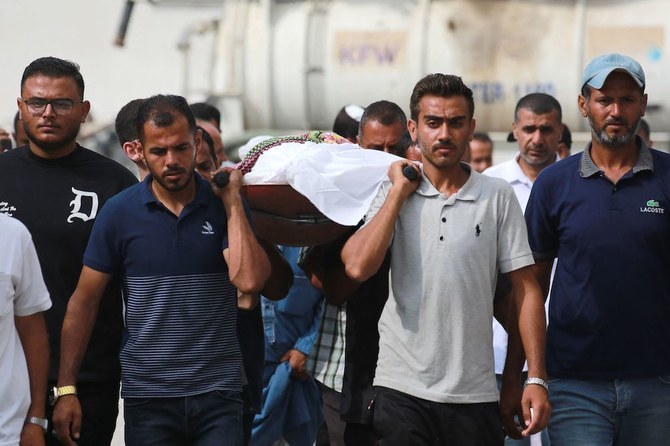CAIRO: At least 42 people were killed in Israeli attacks on districts of Gaza City in the north of the Palestinian enclave on Saturday, the director of the Hamas-run government media office said.
One Israeli strike on houses in Al-Shati, one of the Gaza Strip’s eight historic refugee camps, killed 24 people, Ismail Al-Thawabta said. Another 18 Palestinians were killed in a strike on houses in the Al-Tuffah neighborhood.
The Israeli military released a brief statement saying: “A short while ago, IDF fighter jets struck two Hamas military infrastructure sites in the area of Gaza City.”
It said more details would be released soon.
Exchanges of fire across the Lebanese border between Israel and the powerful Iran-backed militant group Hezbollah have also escalated in recent weeks, raising fears of an even wider war.
UN Secretary-General Antonio Guterres said Friday that the cross-border hostilities must not turn Lebanon into “another Gaza,” warning of the risk of triggering a catastrophe “beyond imagination.”
His warning came as Israel stepped up its strikes in the Gaza Strip, where one hospital in Gaza City reported at least 30 dead on Friday.
Fighting continued Saturday morning, with witnesses reporting gunbattles between militants and Israeli forces in Gaza City.
And in the city’s Zeitun neighborhood, Israeli helicopters fired at militants, witnesses said.
The Israeli military meanwhile said troops continued to carry out operations in central Gaza “eliminating several armed terrorists and dismantling terrorist infrastructure in the area.”
“Fighter jets and additional aircraft struck numerous terror targets in the Gaza Strip, including armed terrorists, weapons storage facilities, and additional terrorist infrastructure,” it added.
In southern Gaza, the ICRC on Friday said 22 dead and 45 wounded people were taken to a Red Cross field hospital after shelling with “heavy calibre projectiles” near its Gaza office.
“Firing so dangerously close to humanitarian structures puts the lives of civilians and humanitarians at risk,” the ICRC said on X.
The health ministry in the Hamas-run territory blamed the shelling on Israel, saying there were 25 killed and 50 wounded in the southern coastal Al-Mawasi area, where thousands of displaced people have been sheltering in tents.
An Israeli military spokesman did not acknowledge any role in the incident but said it was “under review.”
In the north of the Strip, the director of Gaza City’s Al-Ahli hospital was quoted by the territory’s health ministry as reporting 30 dead in strikes.
“It has been a difficult and brutal day in Gaza City. So far, around 30 martyrs have arrived at the Al-Ahli Arab Hospital,” doctor Fadel Naeem was quoted as saying.
Civil defense agency spokesman Mahmud Basal said five municipal workers died when a garage in the city was bombed.
Lebanon-based Hamas ally Hezbollah meanwhile claimed a number of attacks on Israeli troops and positions near the border on Friday, including two using drones.
The Israeli army said it had carried out multiple retaliatory strikes on both days.
Israeli jets on Friday struck a “Hezbollah military structure in the area of Khiam, a Hezbollah military post in the area of Mais Al-Jabal, and Hezbollah terrorist infrastructure in the areas of Taybeh and Tallouseh in southern Lebanon,” the army said in a statement.
Experts are divided on the prospect of a wider war, almost nine months into Israel’s campaign to eradicate Hamas in the Gaza Strip.
Amid the escalating exchanges between Israel and Hezbollah, Israel’s military said Tuesday that plans for an offensive in Lebanon had been “approved and validated.”
Hezbollah chief Hassan Nasrallah said “no place” in Israel would “be spared our rockets” in a wider war, and also threatened nearby European Union member Cyprus.
Citing the “bellicose rhetoric” on both sides, UN chief Guterres warned Friday that the risk of all-out war was real.
“One rash move — one miscalculation — could trigger a catastrophe that goes far beyond the border, and frankly, beyond imagination,” he said.
Israel’s ally the United States has appealed for de-escalation.
The violence on the Lebanon border began after the October 7 attack on southern Israel by Hamas militants from Gaza. That attack resulted in the deaths of 1,194 people, mostly civilians, according to an AFP tally based on Israeli official figures.
The militants also seized hostages, 116 of whom remain in Gaza although the army says 41 are dead.
As of Thursday, Israel’s retaliatory offensive had killed at least 37,431 people, also mostly civilians, according to Gaza’s health ministry.
Months of negotiations toward a truce and a hostage release have failed to make headway, but mediator Qatar insisted Friday it was still working to “bridge the gap” between Israel and Hamas.
The war has destroyed much of Gaza’s infrastructure and left residents short of food, fuel and other essentials.
On June 16 the army said it would implement a daily “tactical pause of military activity” in a southern Gaza corridor to facilitate aid delivery.
But on Friday Richard Peeperkorn of the World Health Organization said “we did not see an impact on the humanitarian supplies coming in.”
Hisham Salem in Jabalia camp said: “The markets... used to be full, but now there is nothing left. I go around the entire market and I can’t find a kilo of onions, and if I do... it costs 140 shekels ($37).”
Doctor Thanos Gargavanis, a WHO trauma surgeon and emergency officer, said the UN in Gaza was trying to “operate in an unworkable environment.”
According to the WHO, 17 of the 36 hospitals in Gaza are operational, but only partially.
Israel’s military on Friday identified two more soldiers killed in Gaza, bringing the death toll since ground operations began to at least 312.
The war has revived a global push for Palestinians to be given a state of their own.
Armenia on Friday declared its recognition of “the State of Palestine,” prompting Israel to summon its ambassador for “a severe reprimand.”






















